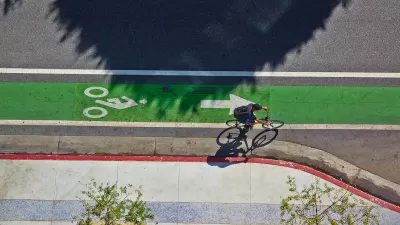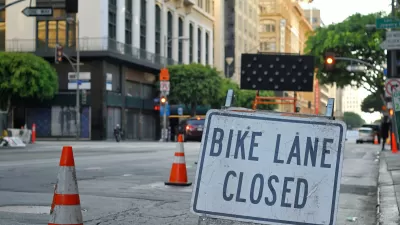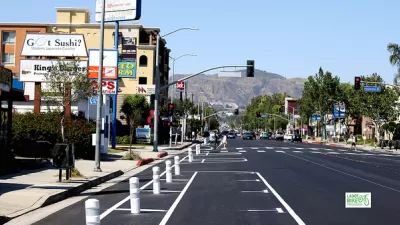Years of planning and strong political support aren't enough when the city council doesn't follow the letter of the law. Now opponents of L.A.'s Mobility Plan 2035 smell blood in the water.
"Faced with a lawsuit from a Westside nonprofit, several council members have concluded that they need to rescind the plan that was passed in August, make some quick changes and approve a slightly different version of the same document," reports David Zahniser.
The plan in question is called Mobility Plan 2035, and it was approved in August 2015. At the time, Zahniser called the plan a "new and controversial exercise in behavior modification." Since then a group of local neighborhood activists called Fix the City sued the city over the project, leading to this week's bureaucratic maneuverings.
The article offers another chance for politicians and activists to bring out their best soundbites—with the exception of Los Angeles Council President Herb Wesson, who declined to comment on the "do-over," according to Zahniser, "saying the issue is the subject of litigation."
Zahniser specifically describes how the Los Angeles political process fumbled the plan in its final stages of approval:
"At issue are three changes backed by the council in the run-up to its Aug. 11 mobility plan vote. Councilman Jose Huizar's planning committee added an amendment to ensure that the council, and not just the mayor's office, would be in charge of carrying out the plan, according to Fix the City's lawsuit. It also added language saying 'equity' should be a factor when deciding which transportation project is approved. Meanwhile, Councilman David Ryu won passage of a third amendment that said that public safety should be evaluated before approving changes to public streets."
According to Fix the City, those amendments necessitated review by the city's Planning Commission.
FULL STORY: City Council sets stage for a do-over on 20-year traffic plan

Alabama: Trump Terminates Settlements for Black Communities Harmed By Raw Sewage
Trump deemed the landmark civil rights agreement “illegal DEI and environmental justice policy.”

Planetizen Federal Action Tracker
A weekly monitor of how Trump’s orders and actions are impacting planners and planning in America.

The 120 Year Old Tiny Home Villages That Sheltered San Francisco’s Earthquake Refugees
More than a century ago, San Francisco mobilized to house thousands of residents displaced by the 1906 earthquake. Could their strategy offer a model for the present?

In Both Crashes and Crime, Public Transportation is Far Safer than Driving
Contrary to popular assumptions, public transportation has far lower crash and crime rates than automobile travel. For safer communities, improve and encourage transit travel.

Report: Zoning Reforms Should Complement Nashville’s Ambitious Transit Plan
Without reform, restrictive zoning codes will limit the impact of the city’s planned transit expansion and could exclude some of the residents who depend on transit the most.

Judge Orders Release of Frozen IRA, IIJA Funding
The decision is a victory for environmental groups who charged that freezing funds for critical infrastructure and disaster response programs caused “real and irreparable harm” to communities.
Urban Design for Planners 1: Software Tools
This six-course series explores essential urban design concepts using open source software and equips planners with the tools they need to participate fully in the urban design process.
Planning for Universal Design
Learn the tools for implementing Universal Design in planning regulations.
Clanton & Associates, Inc.
Jessamine County Fiscal Court
Institute for Housing and Urban Development Studies (IHS)
City of Grandview
Harvard GSD Executive Education
Toledo-Lucas County Plan Commissions
Salt Lake City
NYU Wagner Graduate School of Public Service





























